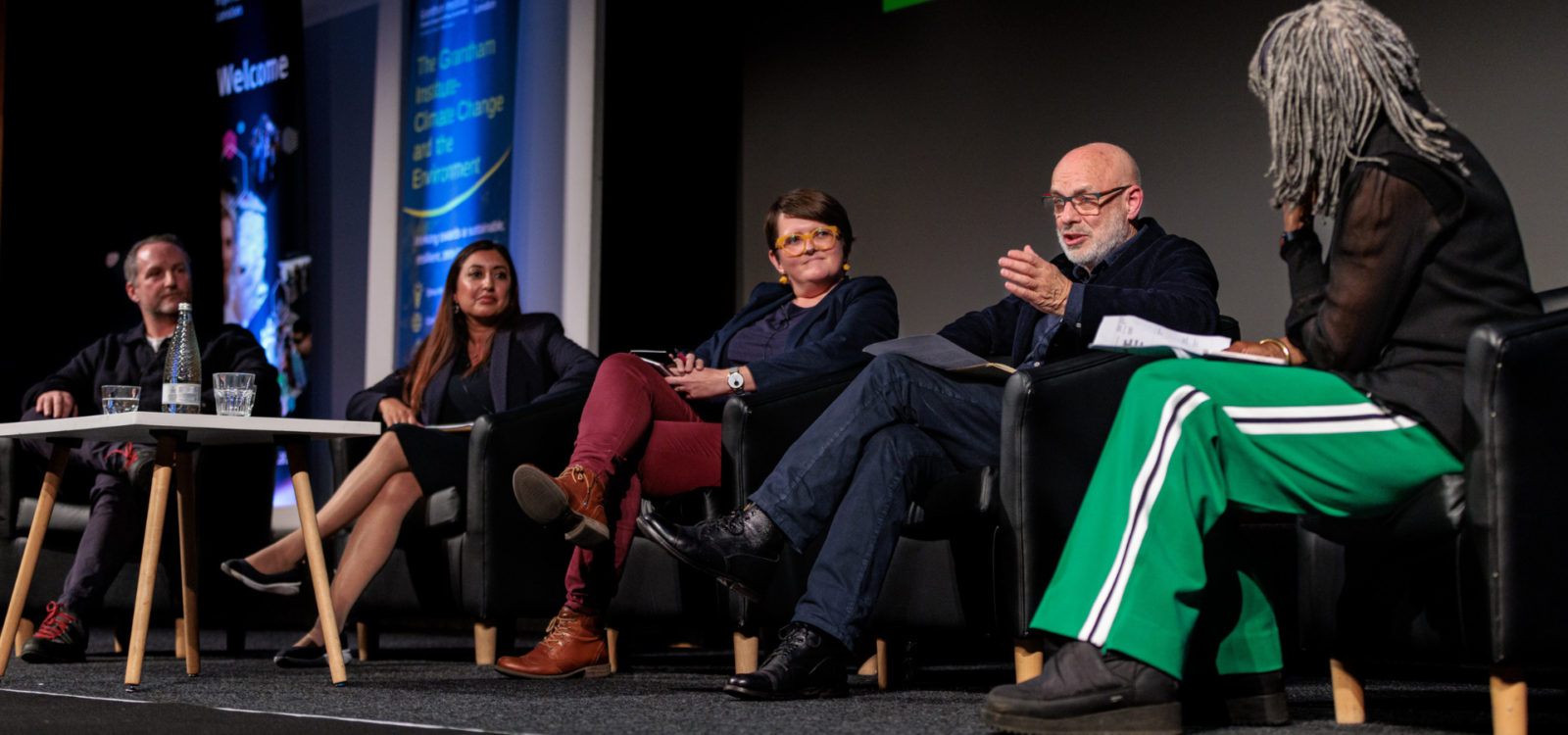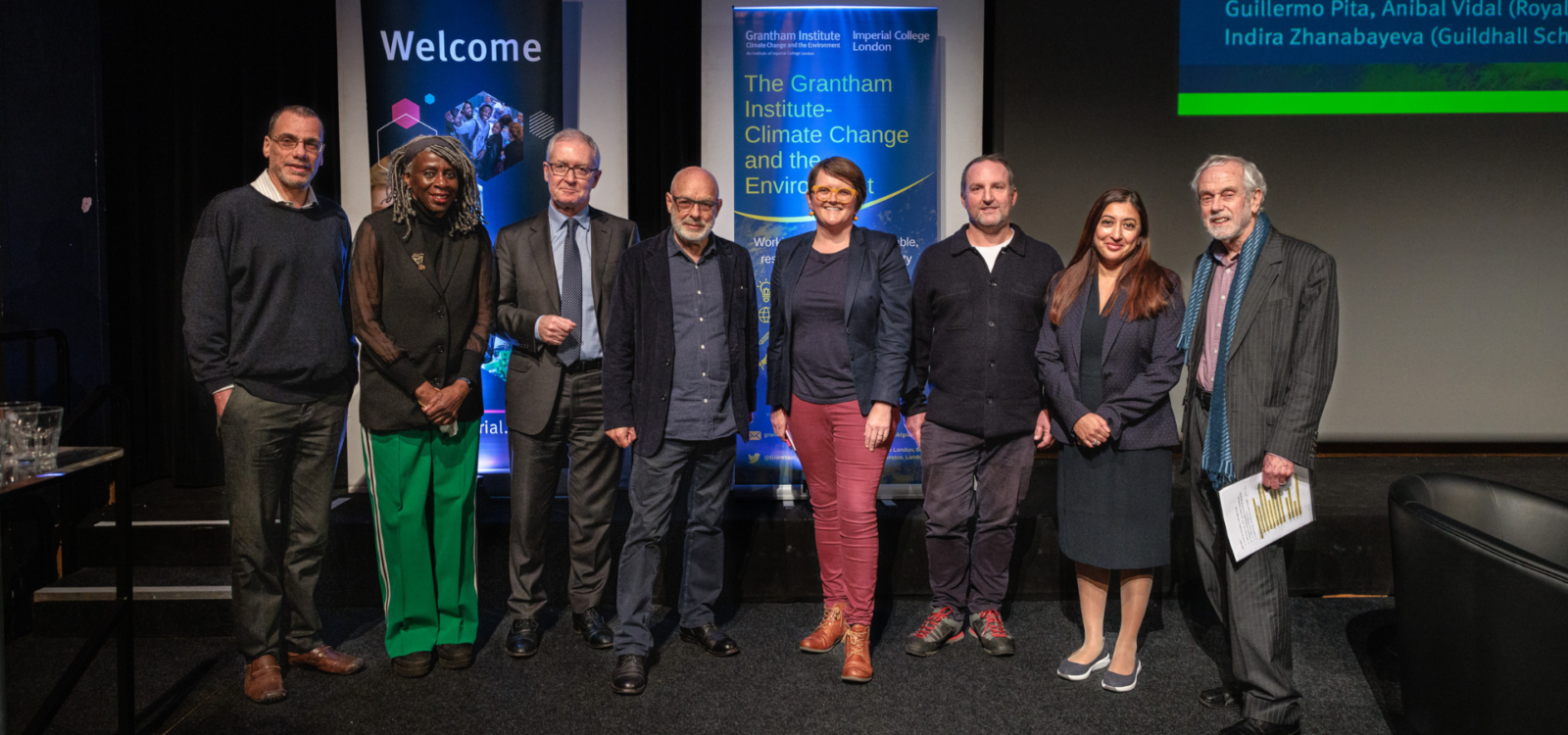
The role of creativity in a climate crisis
Last month Nilesha Chauvet, Managing Director of GOOD, was part of the panel at the Grantham Institute Annual Lecture 2022, which took place at Imperial College London.
She reflects on the event & discussion.
We may feel we’ve heard the words climate crisis too often. But the truth remains: in crisis we still are.
2022 has been glass half full – or empty, depending on how you view it. We’ve made some positive progress, but not nearly enough to counter the environmental wreckage we’ve caused. Some might go as far as to suggest positive steps have been taken, but at the dangerous expense of others.
At COP 27, we saw the establishment of a loss and damage fund to help richer nations take responsibility for carbon emissions for which, as we’ve seen, poorer nations have paid the greatest price. It is still unclear how much money will flow in, from where, and who can take money out. Tackling the root cause of the crisis; commitment around emissions reductions, how to maintain 1.5 degrees pre-industrial levels, creating tangible plans to wean ourselves off fossil fuels … all still up in the air.
At COP 15, we’ve now achieved a global commitment to halt and reverse biodiversity loss by 2030 and to protect 30% of land and oceans by the same date. Also, a commitment to ending human-induced extinctions of threatened species such as rhinos and gorillas.
Whether we view these triumphs as great and much needed, or too little, too late, it’s critical that positive momentum is maintained in 2023.
So, what is preventing us from galvanising action at the levels of speed required?
The Grantham Institute’s Annual Lecture of 2022 explored how creativity might help efforts by shaping and mobilising individual and collective action. Despite the power of creativity to help further social and environmental causes, creative voices are absent from scientific, governmental, and policy-making discussions. Cultural solutions are not systematically integrated into the United Nations Framework Convention on Climate Change, the Paris Agreement, or the Assessment Reports of the IPCC. But we know that stories and narratives, rather than raw information; facts, figures, and endless formulas, is what engages and motivates people to act. Creativity is essential in helping to create new solutions to existing problems. A great space exists for creatives to help lead the charge.
For the first time in UK, the climate crisis is uncomfortably close to home. 78% of Britons are now experiencing some level of eco-anxiety (Global futures). It follows therefore, that we need a unified, end-to-end approach to tackling the problem, where creativity and science can come together, complementing one another, to help shift culture. This means unifying disciplines to help progress talks, to co-create, to rebel together, if necessary, to help push reform.
The Importance of Creativity in Climate Change Narratives
Creativity is seen as a nebulous thing, difficult to understand, the reserve of the naturally gifted, sectioned off, in left brain, right brain fashion, from science. It’s seen as an individual part, instead of being viewed whole. Irrespective of its medium, creativity helps us to understand our place in the world at any given moment in time.
In times of turbulence, creativity can help us envision a better world, and helps us to see our role in it. The objective of creativity is experience, understanding and transformation – however big or small.
The Power of Storytelling:
All creative mediums are forms of storytelling and stories are most powerful when they authentically reflect or encapsulate the spirit of real lives and real people. When stories feel close and personal, they connect with us on a deeper level.
Marketing & Communication focusses on a form of persuasive storytelling – emotion, truth, and action, designed to get us to feel, think or to do something. In a climate crisis, this form of creativity has a role in the virtuous circle of climate solutions as follows:
- Educate: Helps us comprehend the issue, in a simple and holistic way to help reach a consensus. Raising awareness. Providing clarity. Simplifying complex information. It can also help us prioritise actions when resources are limited
- Enrol: Galvanises and mobilises support from individuals and groups to help create new ideas, solutions, and narratives.
- Engage: Connects messages to an audience in a more insightful and emotional way by giving people a role in the story, a sense of purpose and optimism, when the climate challenge can often feel overwhelming. In turn, by coalescing efforts, we can inspire new and greater collaborations, coalitions, co-operations, engaging grass-roots communities to get involved too, so they are no longer excluded, but feel a part of the solution.
- Embed: Drives action in different forms such as campaigning, lobbying, fundraising policymaking, creating much needed reform for tangible, real-world impact.
Creative Power and Cut-Through to Drive Positive Change
- When issues feel too big, dry, and insurmountable, creativity helps them feel more accessible and personal.
- When particularities of language use, for instance, in science and politics, feels alienating and impenetrable, creativity encourages the use of single, universal language forms.
- In a world of constant distraction and noise, creativity helps us stay single-minded in focus.
- When most communication might feel like it is falling on deaf ears and is tone dead, creativity can help convey the right emotion and sentiment.
- Rather than evangelise what a climate solution might be, creativity can invite participation.
- When the dangers of green and purpose-washing remain high, creativity can help us speak truthfully and authentically.
- Rather than alienate, creativity can be inclusive and fully representative of the world at large, stimulating better conversations.
Each stage of a campaign’s journey can be measured not only in terms of the effectiveness of the campaign itself, but also its effect on the wider issue, and its impact in helping to drive positive change.
Right now, creativity is imperative during times of fear. Creativity can help to offer us a more optimistic narrative, backed by rigour and robust evidence, on how a greener and more renewal future can bring prosperity and regeneration. Provided, of course, it is conscious of its own power, its own seduction and danger, and therefore its natural inclination to spin, which can detract from the real issues and decisions that must now be taken.

Nilesha’s fellow panellists are: Brian Eno, musician, producer, visual artist and activist, Jason deCaires Taylor, Sculptor and creator of the world’s first underwater sculpture park and Carly McLachlan, Professor of Climate and Energy Policy, University of Manchester.
The panel was chaired by: Baroness Young of Hornsey OBE, actress, author, and Chancellor of the University of Nottingham
With introductions from Professor Hugh Brady, President of Imperial College London & Professor Sir Brian Hoskins, Chair of the Grantham Institute


